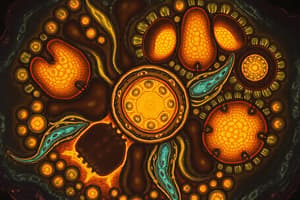Podcast
Questions and Answers
What does the term 'Eukaryotic' refer to in cells?
What does the term 'Eukaryotic' refer to in cells?
- Cells that are unicellular only
- Cells that lack cell membranes
- Cells with a well-defined nucleus (correct)
- Cells with no nucleus
Which characteristic distinguishes plant cells from animal cells?
Which characteristic distinguishes plant cells from animal cells?
- Plant cells lack a nucleus
- Plant cells possess mitochondria
- Plant cells have cytoplasm
- Plant cells have a rigid cell wall (correct)
Which of the following is a correct function of chloroplasts in plant cells?
Which of the following is a correct function of chloroplasts in plant cells?
- Photosynthesis (correct)
- Respiration
- Protein synthesis
- Cell division
How are animal cells primarily characterized in terms of structure?
How are animal cells primarily characterized in terms of structure?
What does the term 'unicellular' refer to?
What does the term 'unicellular' refer to?
Which of the following statements about the roles of plant and animal cells is true?
Which of the following statements about the roles of plant and animal cells is true?
What is the main function of the cell membrane in both plant and animal cells?
What is the main function of the cell membrane in both plant and animal cells?
What is one of the main reasons animal cells do not contain chloroplasts?
What is one of the main reasons animal cells do not contain chloroplasts?
What is the primary function of chloroplasts in plant cells?
What is the primary function of chloroplasts in plant cells?
Which plant cell type is primarily responsible for transporting water and minerals?
Which plant cell type is primarily responsible for transporting water and minerals?
How do parenchyma cells differ from collenchyma cells?
How do parenchyma cells differ from collenchyma cells?
What distinguishes a bacterial cell from a plant cell?
What distinguishes a bacterial cell from a plant cell?
What is the function of the cytoplasm in bacterial cells?
What is the function of the cytoplasm in bacterial cells?
Which type of plant cell is involved in the transport of food produced by leaves?
Which type of plant cell is involved in the transport of food produced by leaves?
How are bacterial cells classified?
How are bacterial cells classified?
What role does the hardening agent play in plant cells?
What role does the hardening agent play in plant cells?
Flashcards are hidden until you start studying
Study Notes
Overview of Cells
- Cells are the fundamental structural and functional units of organisms, derived from the Latin word "cella," meaning "small room."
- Cell classification can vary; major types include eukaryotic (with nuclear membrane) and prokaryotic (without a well-defined nucleus).
- Organisms can be unicellular (single-celled), multicellular (many cells), or acellular (lacking cells).
Animal Cell Characteristics
- Animal cells are eukaryotic, featuring a defined nucleus and membrane-bound organelles like mitochondria, endoplasmic reticulum, and Golgi apparatus.
- Surrounded by a plasma membrane, which separates internal organelles from the external environment.
- Cytoplasm, a fluid medium, suspends cellular components.
- Animals are multicellular, with specialized cells performing diverse functions, allowing for adaptation to active lifestyles.
Types of Animal Cells
- Numerous types exist, each tailored for specific functions.
- Lack chloroplasts, distinguishing them from plant cells as they do not perform photosynthesis.
Plant Cell Characteristics
- Plant cells are eukaryotic, having a true nucleus and similar organelles to animal cells, but also possess chloroplasts for photosynthesis.
- Enclosed by a rigid cell wall, providing structure and support.
Plant Cell Functions
- Primary role in building plant tissues.
- Photosynthesis occurs in chloroplasts, using sunlight, carbon dioxide, and water.
Types of Plant Cells
- Collenchyma Cells: Flexible and support growth without lack of hardening agents in primary walls.
- Sclerenchyma Cells: Harder, providing structural support due to the presence of lignin.
- Parenchyma Cells: Living cells involved in gas exchange, food production, storage, and metabolism; typically flexible due to thinner walls.
- Xylem Cells: Specialized for transporting water and minerals from roots to leaves.
- Phloem Cells: Transport cells responsible for distributing food produced in leaves to various plant parts.
Bacterial Cell Characteristics
- Bacterial cells are prokaryotic, lacking a well-defined nucleus and membrane-bound organelles.
- Genetic material is found in an irregular-shaped region within the cell, in contrast to defined organelles in eukaryotic cells.
Functions of Bacterial Cells
- Cytoplasm (protoplasm) facilitates cell growth, metabolism, and replication.
- Composed of water, enzymes, nutrients, waste, gases, and contains structures like ribosomes, chromosomes, and plasmids.
Types of Bacterial Cells
- Classified into five basic shapes.
- Can exist as single cells, pairs, chains, or clusters.
Differences Among Cell Types
- Key distinctions among plant, animal, and bacterial cells based on structure, organelles, and functions.
Studying That Suits You
Use AI to generate personalized quizzes and flashcards to suit your learning preferences.




